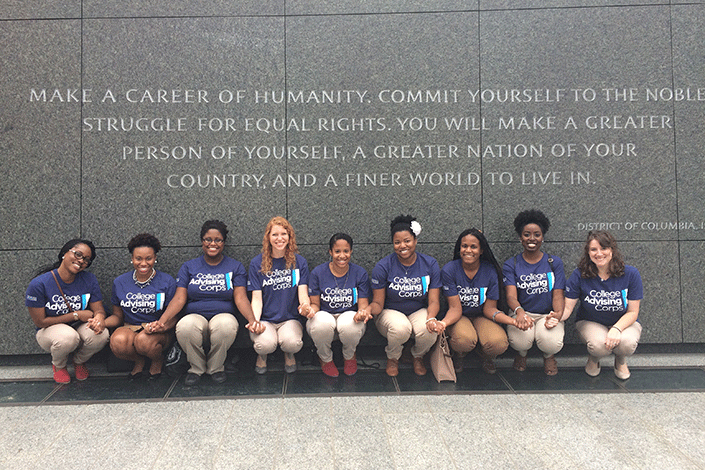In 2005, the University of Virginia launched the Virginia College Advising Corps (then called the College Guide Program), seeking to narrow the growing college access gap for low-income, first-generation and under-represented students. As it marks its 10th anniversary this year, the corps is also celebrating a new wave of growth in Charlottesville and beyond.
An AmeriCorps-affiliated program, the College Advising Corps trains recent U.Va. graduates to offer “near-peer” college advising support to high school students and help them apply to a wide range of higher education institutions. Each adviser is placed in a different Virginia community, where they work full-time at the local high school for two years. Their salaries are paid through a combination of AmeriCorps grants and funds from private donors.
In 2005, the program placed advisers in 14 high schools around the commonwealth; they are now in 23.
“We just added four new high schools in the Northern Neck,” the program’s director, Joy Pugh, said.
To date, the program has helped more than 10,000 Virginia high school students enroll in post-secondary institutions. While students are encouraged to apply to colleges all over the country, a number of advisees set their sites on the University every year.
“I had five students come to U.Va. this year from Nelson County,” said adviser Rebecca Hawes, a 2014 graduate of the College of Arts & Sciences who is starting her second year working at Nelson County High School.
Like her students, Hawes attended a rural high school and knows how intimidating the college application process can be when you come from a smaller community.
“I was lucky to have a good support system in my family, but I felt like within my high school there wasn’t a lot of push for me to go to a competitive or elite school,” she said. “I wanted to help more students see all the opportunities open to them.”
Hawes’s five Nelson-to-U.Va. students are among 88 members of U.Va.’s Class of 2019 who benefitted from the program. At U.Va. alone, there has been a 94 percent increase in students matriculating from College Advising Corps-served high schools since the program began.
Some of those students are driven to give back to the program that put them on the path to Grounds.
“I knew I wanted to come back locally and help the community where I grew up and learned so much,” said Patrick County High School adviser Emily Wimmer.
Wimmer, also a 2014 graduate of the College, had her own adviser when she was a senior at Martinsville High School. She credits her adviser with helping her overcome the information gap that was holding her back on college applications.
“Neither of my parents really had experience with how to apply to college and what we needed to do,” Wimmer said. “I had a college adviser named Chelsea Duncan, and she really helped me through the whole process, step by step.”
After following in her adviser’s footsteps, Wimmer is thrilled to see the impact she is having in the lives of her students.
“I had this wonderful student who didn’t have much support from home. She was first-generation, low-income, and really wanted to go to U.Va. or William & Mary,” Wimmer said. “She ended up getting into both. I helped her with financial aid and she got a full ride from U.Va. I just texted her yesterday to check in, and she is so happy being in Charlottesville now.”
In addition to giving back, advisers also have the opportunity to advance their own educational goals through the program. Upon completion of their two years of service, each receives an $11,000 education award that can be used for graduate studies or the repayment of student loans. Still, for many the greatest reward is watching how their students mature and gain confidence throughout the application process.
“I saw certain students that I worked with change over the course of the year,” said Staige Davis, adviser to Charlottesville High School and a 2014 graduate of the College. “I had one student that could advocate for herself in person, but didn’t like to talk on the phone and she had several financial aid questions that had to be made over the phone.”
Davis sat with the girl as she made the calls, carefully going over what she should ask beforehand. By the spring, the student was able to call on her own for all the information she needed and was no longer afraid to reach out with questions.
Due to the College Advising Corps’ success, students all around the country now have access to the kind of in-person support that Davis provides. The program became the model for the National College Advising Corps – now the College Advising Corps – in 2007.
Using U.Va. as an example, the national corps has set up similar programs with 23 university partners in 14 other states. They served more than 144,000 students during the 2014-15 school year.
As the scale of the Virginia College Advising Corps and its national counterpart continue to grow, the advisers see their individual impact every day.
“There are students who I sat down with a couple times a week to work on applications, and I feel pretty sure that no one else would have done that with them,” Davis said. “Without that support, I don’t think they would have gone on to college and that would be a real loss.”
Media Contact
Article Information
September 1, 2015
/content/virginia-college-advising-corps-lights-path-higher-education

